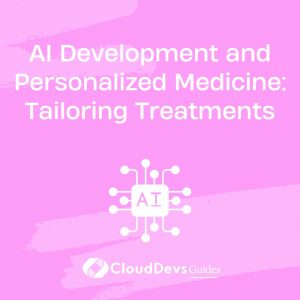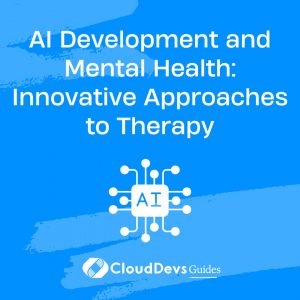AI Development and Personalized Medicine: Tailoring Treatments
Understanding Personalized Medicine
Personalized medicine involves customizing healthcare to individual patients based on their genetic, environmental, and lifestyle factors. By moving away from the “one-size-fits-all” approach, personalized medicine aims to provide more effective and targeted treatments, improving patient outcomes and reducing side effects.
The Role of AI in Personalized Medicine
Artificial intelligence (AI) plays a crucial role in the development of personalized medicine. With its ability to analyze large datasets, identify patterns, and predict outcomes, AI helps in tailoring treatments to individual patients more accurately and efficiently. Below, we’ll explore key aspects of AI in personalized medicine and provide examples of how AI can be used in this domain.
1. Analyzing Patient Data
The first step in personalized medicine is to analyze patient data, including genetic information, medical history, and lifestyle factors. AI algorithms can process and analyze this data at scale, uncovering insights that would be difficult to detect manually.
Example: Analyzing Genomic Data
AI can be used to analyze genomic data to identify genetic variations that may influence a patient’s response to a particular treatment.
```python
# Pseudocode for AI-driven genomic data analysis
from ai_genomics_library import GenomicAnalyzer
def analyze_genome(patient_genome):
analyzer = GenomicAnalyzer()
variants = analyzer.identify_variants(patient_genome)
return variants
# Assume `patient_genome` contains the genomic data
variants = analyze_genome(patient_genome)
print("Identified Variants:", variants)
```
2. Predictive Modeling for Treatment Outcomes
AI-driven predictive models can forecast how a patient is likely to respond to a specific treatment, allowing healthcare providers to select the most effective therapy.
Example: Predicting Drug Response
Here’s how you might develop an AI model to predict a patient’s response to a particular drug based on their medical history and genetic profile.
```python
# Pseudocode for AI-driven drug response prediction
from ai_medical_library import TreatmentPredictor
def predict_drug_response(patient_data):
predictor = TreatmentPredictor()
response = predictor.predict(patient_data)
return response
# Assume `patient_data` includes patient history and genetic data
predicted_response = predict_drug_response(patient_data)
print("Predicted Drug Response:", predicted_response)
```
3. Developing Personalized Treatment Plans
Once AI has analyzed the data and predicted outcomes, it can be used to develop personalized treatment plans that are tailored to the individual needs of each patient.
Example: AI-Driven Treatment Plan
An AI system might recommend a personalized treatment plan based on a combination of patient data, clinical guidelines, and the latest research.
```python
# Pseudocode for AI-driven personalized treatment planning
from ai_healthcare_library import TreatmentPlanner
def create_treatment_plan(patient_profile):
planner = TreatmentPlanner()
plan = planner.generate_plan(patient_profile)
return plan
# Assume `patient_profile` includes detailed patient information
treatment_plan = create_treatment_plan(patient_profile)
print("Recommended Treatment Plan:", treatment_plan)
```
4. AI-Powered Drug Discovery
AI is also revolutionizing the field of drug discovery, enabling the identification of new drug candidates that can be tailored to specific genetic profiles or disease subtypes.
Example: Identifying New Drug Candidates
Here’s how AI can be used to discover new drugs tailored to specific genetic mutations.
```python
# Pseudocode for AI-driven drug discovery
from ai_drug_discovery_library import DrugDiscoveryEngine
def discover_new_drugs(target_profile):
engine = DrugDiscoveryEngine()
drug_candidates = engine.identify_candidates(target_profile)
return drug_candidates
# Assume `target_profile` represents the genetic target for the new drug
new_drugs = discover_new_drugs(target_profile)
print("New Drug Candidates:", new_drugs)
```
Conclusion
AI is transforming the landscape of personalized medicine by enabling more precise and tailored treatments. From analyzing patient data to predicting treatment outcomes and discovering new drugs, AI provides powerful tools that can significantly enhance the effectiveness of healthcare. By leveraging AI, the promise of personalized medicine is becoming a reality, offering new hope for patients worldwide.
Further Reading:
Table of Contents









